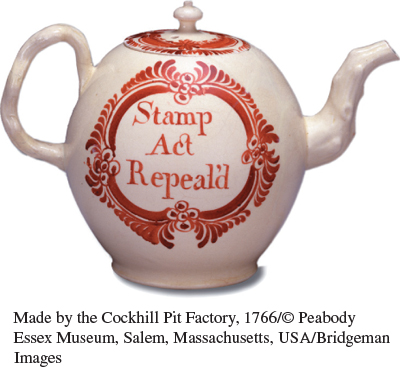A History of Western Society: Printed Page 615
A History of Western Society, Value Edition: Printed Page 591
A History of Western Society, Concise Edition: Printed Page 614
Chapter Chronology
The Origins of the Revolution
The high cost of the Seven Years’ War doubled the British national debt. Anticipating further expenses to defend the half a billion acres in new territory granted by the Treaty of Paris, the government in London imposed bold new administrative measures. Breaking with a tradition of loose colonial oversight, the British announced that they would maintain a large army in North America and tax the colonies directly. In 1765 Parliament passed the Stamp Act, which levied taxes on a long list of commercial and legal documents, diplomas, newspapers, almanacs, and playing cards. A stamp glued to each article indicated that the tax had been paid.

Commemorative Teapot Manufacturers were quick to bring products to the market celebrating weighty political events, like this British teapot heralding “Stamp Act Repeal’d.” By purchasing such items, ordinary people could champion political causes of the day and bring public affairs into their private lives.
(Made by the Cockhill Pit Factory, 1766/© Peabody Essex Museum, Salem, Massachusetts, USA/Bridgeman Images)
These measures seemed perfectly reasonable to the British, for a much heavier stamp tax already existed in Britain, and proceeds from the tax were to fund the defense of the colonies. Nonetheless, the colonists vigorously protested the Stamp Act by rioting and by boycotting British goods. Thus Parliament reluctantly repealed it.
Another area of contention was settlement of the new territory acquired by the Treaty of Paris. At the end of the Seven Years’ War, land-squeezed settlers quickly moved west across the Appalachian Mountains into the Ohio Valley, sparking conflict with the Ottawa and other tribes already present in the region as well as remaining French settlers. To prevent costly wars in distant territory, the British government in 1763 issued a royal proclamation prohibiting colonists to settle west of the Appalachian Mountains. The so-called Proclamation Line did little to stem land speculation and the flow of migrants, but it did exacerbate suspicion and tensions between Britain and its colony. These disputes raised important political questions. To what extent could the British government reassert its power while limiting the authority of elected colonial bodies? Who had the right to make laws for Americans? The British government replied that Americans were represented in Parliament, albeit indirectly (like most British people), and that Parliament ruled throughout the empire. Many Americans felt otherwise. In the words of John Adams, a major proponent of colonial independence, “A Parliament of Great Britain can have no more rights to tax the colonies than a Parliament of Paris.” Thus British colonial administration and parliamentary supremacy came to appear as unacceptable threats to existing American liberties.
Page 616
Americans’ resistance to these threats was fed by the great degree of independence they had long enjoyed. In British North America, unlike in England and Europe, no powerful established church existed, and religious freedom was taken for granted. Colonial assemblies made the important laws, which were seldom overturned by the British government. Also, the right to vote was much more widespread than in England. In many parts of colonial Massachusetts, for example, as many as 95 percent of adult males could vote.
Moreover, greater political equality was matched by greater social and economic equality, at least for the free white population. No hereditary nobility exercised privileges over peasants and other social groups. Instead, independent farmers dominated colonial society. This was particularly true in the northern colonies, where the revolution originated.
In 1773 disputes over taxes and representation flared up again. Under the Tea Act of that year, the British government permitted the financially hard-pressed East India Company to ship tea from China directly to its agents in the colonies, rather than through London middlemen, who sold to independent merchants in the colonies. Thus the company secured a profitable monopoly on the tea trade, and colonial merchants were excluded. The price on tea was actually lowered for colonists, but the act generated a great deal of opposition because of its impact on local merchants.
In protest, Boston men disguised as Native Americans staged a rowdy protest (later called the “Tea Party”) by boarding East India Company ships and throwing tea from them into the harbor. In response, the so-called Coercive Acts of 1774 closed the port of Boston, curtailed local elections, and expanded the royal governor’s power. County conventions in Massachusetts urged that the acts be “rejected as the attempts of a wicked administration to enslave America.” Other colonial assemblies joined in the denunciations. In September 1774 the First Continental Congress — consisting of colonial delegates who sought at first to peacefully resolve conflicts with Britain — met in Philadelphia. The more radical members of this assembly argued successfully against concessions to the English crown. The British Parliament also rejected compromise, and in April 1775 fighting between colonial and British troops began at Lexington and Concord.
